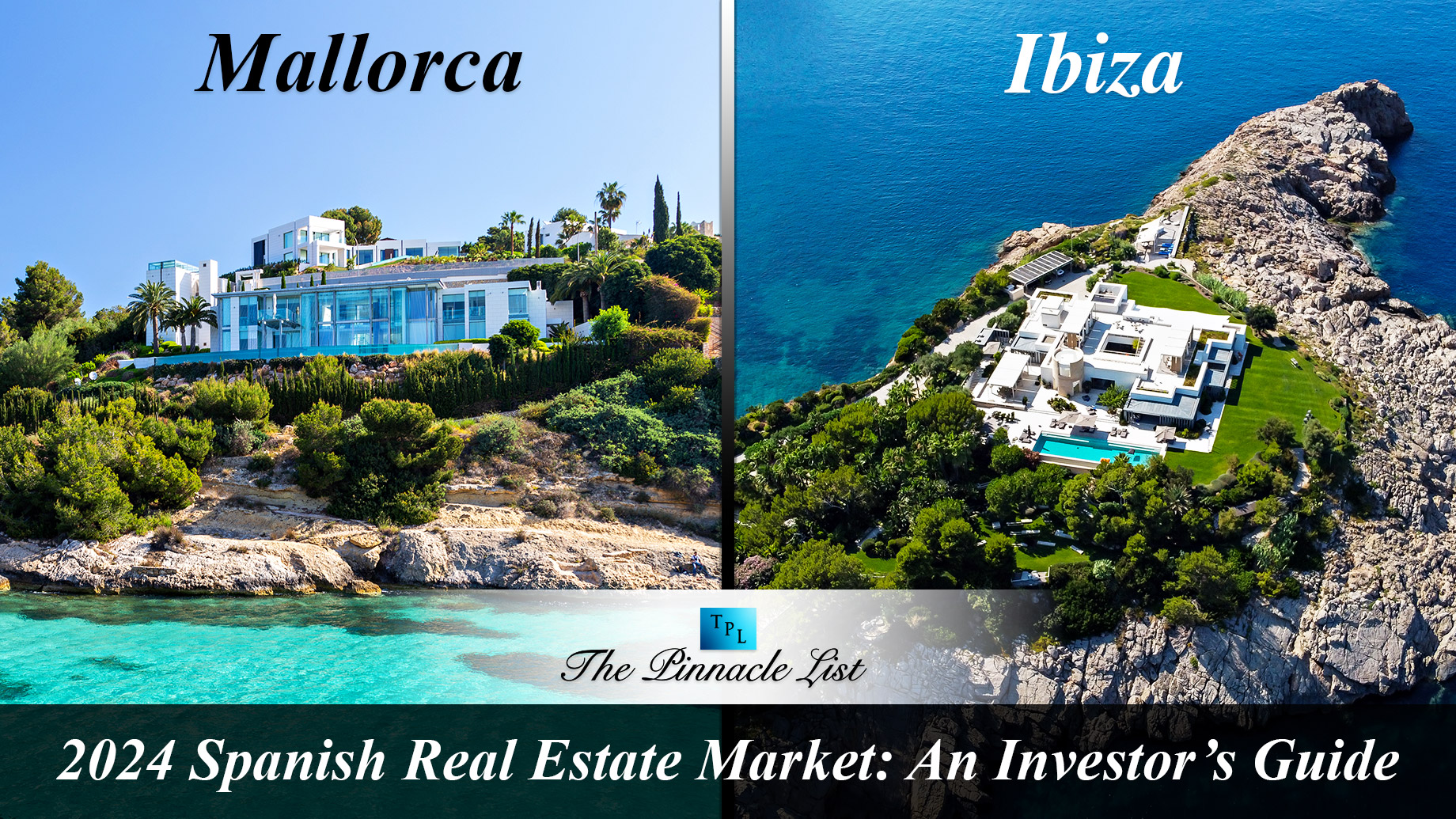
The Balearic Islands of Mallorca and Ibiza in Spain have long been coveted destinations for real estate investment. As we navigate through 2024, it’s essential to have a clear understanding of the current market conditions. This article provides a detailed look at the latest real estate trends, prices, and investment opportunities in these Mediterranean hotspots.
Mallorca’s Real Estate Market: Current Prices and Predictions
Mallorca’s property market has shown consistent growth, and 2024 is no exception. The region of Andratx, known for its luxury properties and scenic views, has a current price per square metre of €5,279, with a predicted increase to €5,965, according to Balearic Properties Real Estate.
Calvià, another prime location, boasts a current price per square metre of €5,511, with an anticipated rise to €6,505. Alcúdia and Manacor offer more affordable options for sale, with current prices per square metre between €1,796 and €3,510, with predicted increases to reach between €1,912 and €4,177. Palma, the capital city, remains the most popular region for new property purchases due to its vibrant urban lifestyle and amenities, where the price per square metre is €3,877, as of January 2024.
Ibiza’s Property Market: A Premium Investment Choice
Ibiza’s real estate market continues to thrive, with an average property price per square metre standing at €4,500, as of 2022. The island’s allure as a premier tourist destination contributes to its relatively higher prices compared to other Mediterranean locales.
In February 2024, residential properties for sale in Ibiza were asking an average of €6,048 per square metre, marking an 11.77% increase from the previous year. Currently, the most expensive area in Ibiza is Dalt Vila-La Marina, with an average sale price of €7,148 per square metre.
Navigating the Buying Process
Investing in Mallorca or Ibiza requires an understanding of the buying process and financial planning, as a Spanish mortgage calculator will come in handy as an essential tool for estimating mortgage payments and assessing affordability.
Here is a simplified overview of the property purchase process in Spain:
- Property Search and Selection: Start by researching and visiting potential properties to find one that meets your criteria. Idealista is one of the more popular platforms for real estate services in Spain.
- Legal Checks: Find a lawyer who specializes in Spanish real estate law to conduct due diligence, ensuring the property is free of any legal encumbrances.
- Reservation Agreement: Secure the property with a deposit and a reservation agreement, which takes the property off the market as legal checks continue.
- Signing the Contract: Once due diligence is complete, a private purchase contract (contrato de compraventa) is signed, and a further deposit is usually required.
- Completion: The final step involves signing the deed of sale (escritura de compraventa) in front of a Notary, paying the remaining balance, and officially transferring the ownership.
In general, legal advice is crucial to ensure a smooth transaction. Buyers should engage with independent legal experts to verify the property’s legal status and navigate the tax implications of the purchase.
Investment Considerations for 2024
Both Mallorca and Ibiza offer strong potential for value retention and appreciation, especially in the luxury segment. The limited supply of super prime luxury properties in sought-after locations highlights the importance of making timely investment decisions.
When considering a real estate investment in 2024, there are several key factors to take into account, such as being aware of the nuances of property taxes and the rental market potential, which can significantly impact your overall investment strategy.
Property Taxes in Mallorca and Ibiza
Understanding the property tax implications is essential when purchasing real estate in Spain. In Mallorca and Ibiza, as in the rest of Spain, buyers are subject to several taxes. The Transfer Tax (Impuesto de Transmisiones Patrimoniales, ITP) applies to resale properties and is typically between 8% to 11%, depending on the property’s value. For new properties, buyers must pay VAT (IVA) at 10% and Stamp Duty (Actos Jurídicos Documentados, AJD), which varies, but is usually around 1.5%.
Additionally, property owners in Spain are subject to an annual property tax called IBI (Impuesto sobre Bienes Inmuebles), which is calculated based on the cadastral value of the property and can vary significantly depending on the municipality. Non-resident property owners are also subject to a Non-Resident Income Tax (Impuesto sobre la Renta de No Residentes), based on the property’s deemed rental income.
Rental Market Potential in Mallorca and Ibiza
The rental market in both Mallorca and Ibiza is robust, driven by the islands’ popularity as tourist destinations. Investors can potentially achieve high yields from short-term vacation rentals, particularly during peak tourist seasons. However, it’s important to note that the local governments have implemented regulations to control the rental market, which includes obtaining a license for tourist rentals.
In Mallorca, the rental market has seen a significant increase in demand, particularly for seasonal rentals, which can command high prices. The average rental price in Mallorca as of January 2023 was €13.8 per square metre – a 16.7% increase from the previous year, indicating a strong potential for rental income.
Ibiza’s rental market is even more lucrative, with an average asking price of €25.89 per square metre per month, as of February 2024. The island’s limited supply of rental properties, coupled with high demand from tourists, creates an opportunity for investors to capitalize on short-term rental income.
Making Timely Investment Decisions
The limited supply of prime properties in sought-after locations on both islands underscores the importance of acting swiftly when making investment decisions. The luxury segment, in particular, is competitive, with high-net-worth individuals often ready to invest in the most desirable properties.
Conclusion
The real estate markets in Mallorca and Ibiza offer promising opportunities for investors and homebuyers in 2024. With a history of sustained growth, an eclectic offering of properties, and strong demand from international buyers, these islands represent solid investments in the Spanish real estate landscape.
